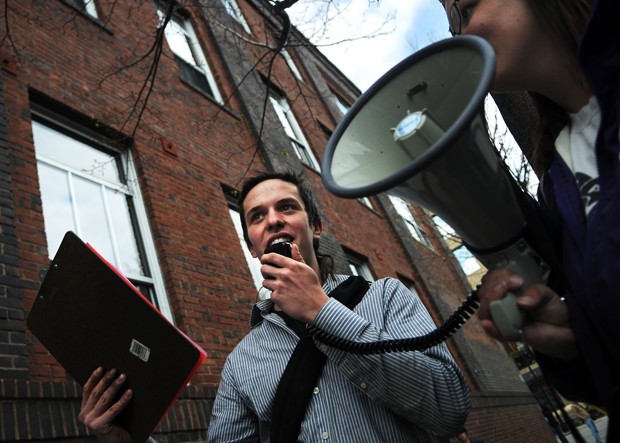ItâÄôs been an outraged and outspoken eight months since their arrests for the accused activists known as the RNC 8, who were preemptively arrested for allegedly plotting to violently disrupt SeptemberâÄôs Republican National Convention. The Ramsey County AttorneyâÄôs Office, at its strictest, sought to prosecute each of them with four felonies, including two each with controversial terrorism enhancements under MinnesotaâÄôs version of the PATRIOT Act. Last month, Ramsey County Attorney Susan Gaertner âÄî who the eight and their supporters have protested against âÄî announced her office will drop the terrorism charges. But the activists arenâÄôt satisfied. They plan to continue their battle against the remaining charges, which they say represent an unfounded war on dissent. The First AmendmentâÄôs place in the RNC 8 cases can be traced back to the beginning. The arrests, for example, raise fundamental First Amendment issues. Law enforcement officers infiltrated and monitored the activists at their planning meetings months ahead of the RNC. Based on information gathered by informants, officers raided RNC 8 membersâÄô homes and ultimately arrested each of them. The activists were jailed through the convention. University of Minnesota law professor David Schultz is a First Amendment expert who recently helped edit the first-ever encyclopedia of the First Amendment. Policing tactics aimed at blocking voices of opposition, specifically preemptively arresting known dissenters of government, is a legitimate threat to free expression, he said. âÄúUnfortunately, this is an all-too-frequent technique that a lot of governments use when they want to break up demonstrations,âÄù Schultz said. âÄúThey use the pretext of keeping the peace and preventing a riot.âÄù The Ramsey County SheriffâÄôs Office has faced scrutiny for its handling of protesters before and during the RNC but has publicly stood by its actions. In the cases of the RNC 8, Schultz said the rationale for arresting the activists is murky. Recalling a Supreme Court precedent, he said speech is constitutionally protected until a person advocates âÄúimminent lawlessness.âÄù âÄúIf people want to discuss and say, âÄòLetâÄôs get 20 of us and go down and protest,âÄô thatâÄôs not forming a riot,âÄù he said. âÄúThatâÄôs people expressing their First Amendment rights. That kind of plotting âÄî if you can call it that âÄî is protected.âÄù Officials have alleged the RNC 8 had in their possession materials to threaten safety at the convention. The activists have vehemently denied having serious plans to endanger anyone during the RNC. Still, Gaertner has said in past interviews that her office can prove the charges against the activists beyond a reasonable doubt. Convictions could carry jail time and fines for the RNC 8. Minnesota state tradition, which Schultz said strays from broadly endorsing dissent, could help the prosecution at trial. âÄúWe live in a culture and a state that seems to thrive on consensus and less on people sticking out,âÄù he said. âÄúGiven that the government has arrested them, you immediately have the image that the protesters are a bunch of criminals.âÄù The state constitution, he said, offers more liberal protection than its federal counterpart when it comes to religious freedom, equal protection and due process âÄî but not free speech. ItâÄôs unclear at this point whether the RNC 8 trials, expected to start as early as September, will end in convictions. But attorney Robert Kolstad, who is representing an RNC 8 member, said that even without convictions, the RNC 8 cases have already caused significant if not irreparable damage to the culture of political protest. By positioning the RNC 8 as examples for the public, he said, the government is attempting to punish organized opposition. âÄúWhen the government criminalizes dissent, theyâÄôre able to pierce through the actions and the words of people to undermine their First Amendment expressive rights,âÄù Kolstad said. Government action against the RNC 8 has been far from subtle. The sanctions, Kolstad said, feed into a hesitation to politically organize. âÄúPeople donâÄôt expect to be labeled or to be found to be criminals because they disagree with the government,âÄù he said. âÄúDissent is a big part of what the people hold dear. ItâÄôs almost like itâÄôs a part of the contract the people have permitting themselves to be governed.âÄù University of Minnesota cultural studies junior and RNC 8 member Max Specktor said that lately heâÄôs sensed apprehension in the political organizing community. âÄúA lot of people have been saying that theyâÄôre scared to even talk about these things even though weâÄôre supposed to have the freedom to talk under the First Amendment âÄî in theory, at least âÄî about organizing protest,âÄù he said. Moving forward, Kolstad said a best-case scenario is one in which people continue protesting despite an apparent crackdown on dissent. âÄúIt would be good for people to continue to engage in political activity,âÄù he said, âÄúbecause that will be the people who are politically active saying to the government, âÄòWe are afraid, but I am going to continue to dissent.âÄô âÄù âÄîKarlee Weinmann is a senior staff reporter.















